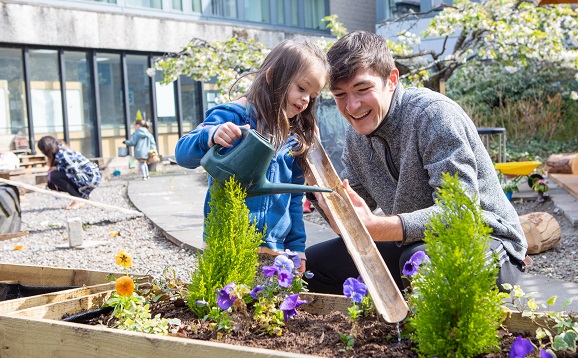Faculty of Natural Sciences business support and services
University of Stirling's Faculty of Natural Sciences can offer a range of specialist business services, facilities and consultancy.
The Forth Environmental Resilience Array (Forth-ERA)
A world-first, the Forth Environmental Resilience Array is a digital observatory that enables monitoring of water stress and resilience.
It is a state-of-the-art, user-driven, catchment-scale observatory for the full Forth basin, Scotland, developed by the University of Stirling. It uses data from distributed sensor networks, Earth observation, and models to provide actionable intelligence on the state and trajectory of water resources and the pressures acting upon them.
In-situ networks of static and mobile sensors will provide high frequency, real-time data on water quantity and quality located using satellite navigation and connected to the cloud via cellular and satellite communications. The data from these networks will also support the calibration and validation of Earth Observation data products. We have developed a suite of Earth Observation services for water resource monitoring and management using open access Copernicus data as well as observations from commercial providers.
We’re strongly connected to the UK Water Partnership, UK Water Industry Research and British Water. Internationally we’re engaged with the UNEP GEMS Water and World Water Quality Alliance.
Forth-ERA has gained supersite status with the DANUBIUS-RI pan-European research infrastructure on River-Sea systems.
Environmental Radioactivity Laboratory (ERL)
The Environmental Radioactivity Laboratory measures how much radiation is in the environment. Our focus is on understanding how radiation affects the environment over time and in different places. We do this by studying things like soil erosion and sediment build-up. Our team and equipment are some of the best in the UK for monitoring radiation in the environment.
Our expert team can provide specialised environmental services including:
- habits surveys,
- environmental dose modelling,
- scanning electron microscopy,
- and micro-scale digital imaging.
Stirling Analyses for Geoarchaeology (StAG)
Stirling Analyses for Geoarchaeology (StAG) provides a range of professional services and analysis for archaeologists.
Our modern laboratories include:
- SEM-EDS Lab
- Stimulated Luminescence (OSL) Lab
- Portable X-Ray Fluorescence (XRF) Lab
Thin section slide production lab and micromorphology/image analysis lab
Our experts in thin section and micromorphology specialise in the production of large format (75 x 110 mm) thin section slides from soils and sediments from locations across the world. They have lots of experience dealing with organic rich samples, such as peat and heavy clay materials. They also have experience in producing slides from a wide variety of other materials such as rock, egg shell, bone, wood, ceramics, fossils, leather, and many others.


